2020冀教版七年级英语下册Unit 4 After-School Activities Lesson 19 A Dinner Date课件 (共23张PPT)
文档属性
| 名称 | 2020冀教版七年级英语下册Unit 4 After-School Activities Lesson 19 A Dinner Date课件 (共23张PPT) |

|
|
| 格式 | zip | ||
| 文件大小 | 3.4MB | ||
| 资源类型 | 教案 | ||
| 版本资源 | 冀教版 | ||
| 科目 | 英语 | ||
| 更新时间 | 2020-05-06 15:56:38 | ||
图片预览

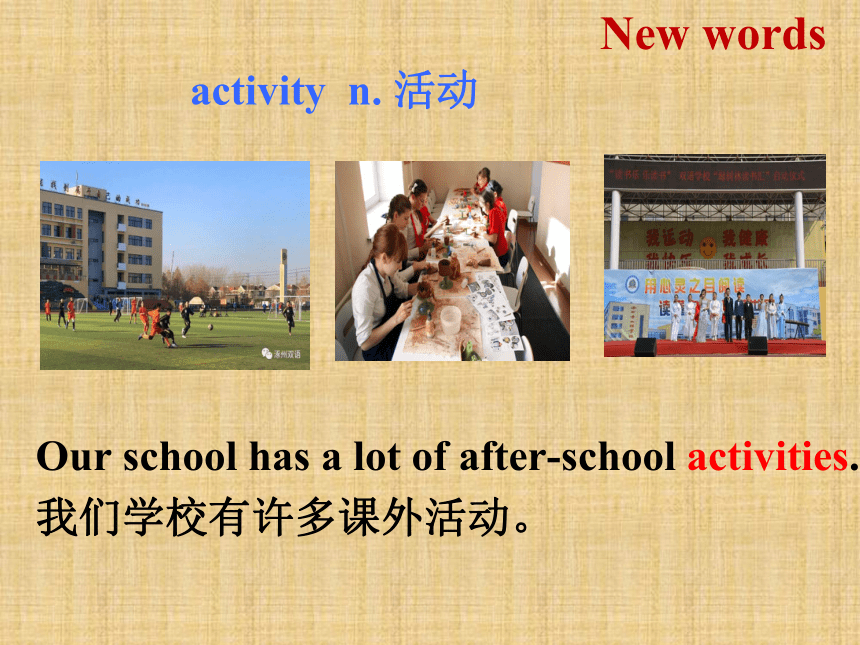

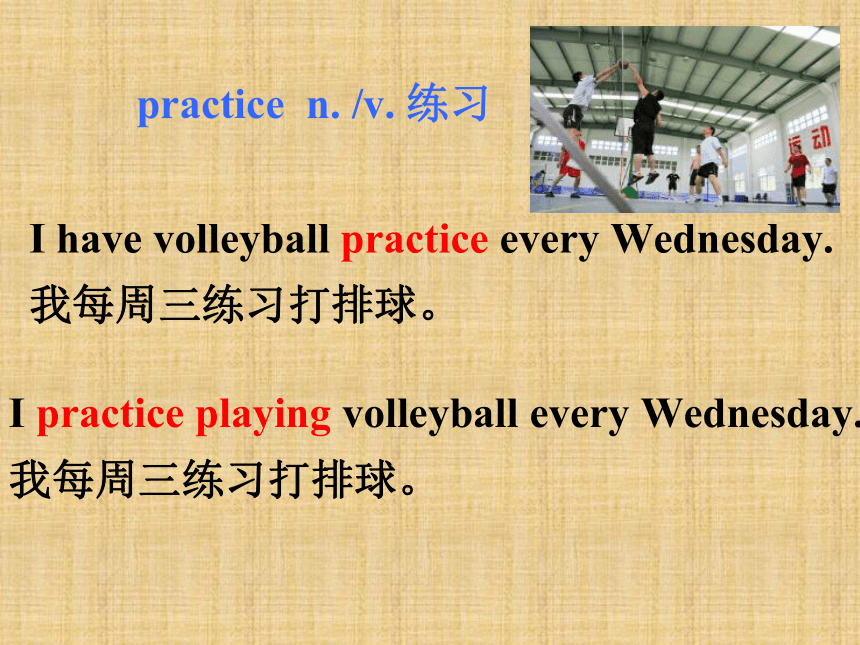
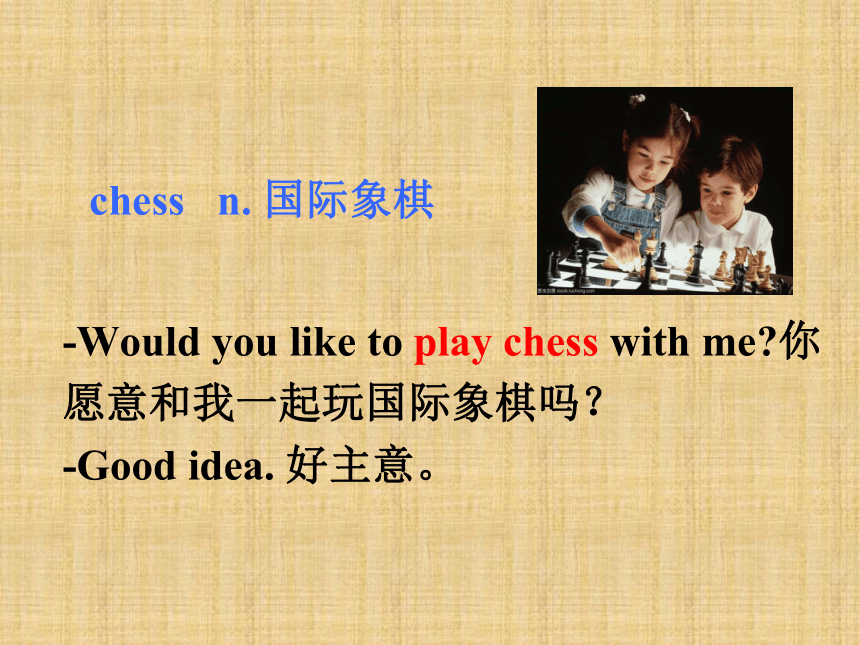

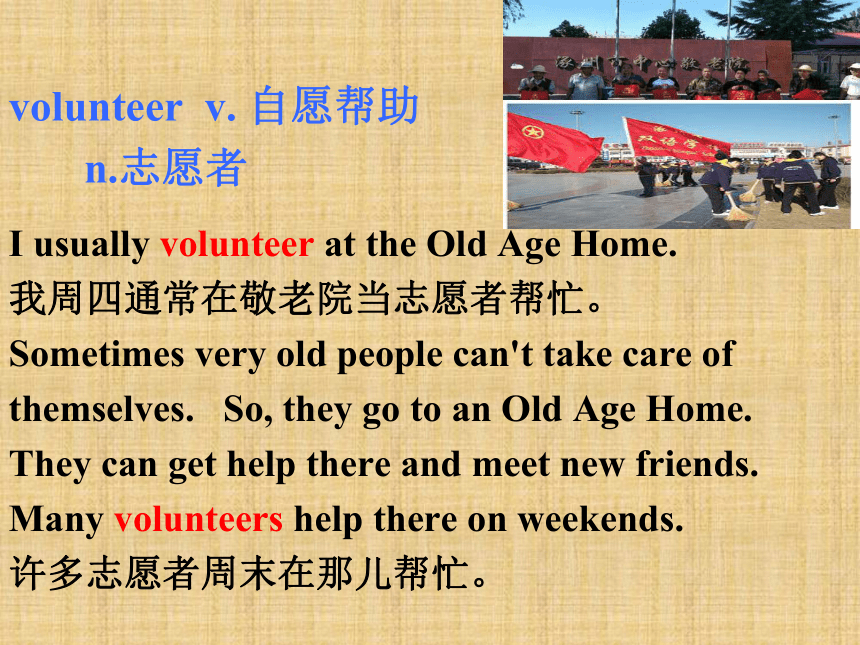
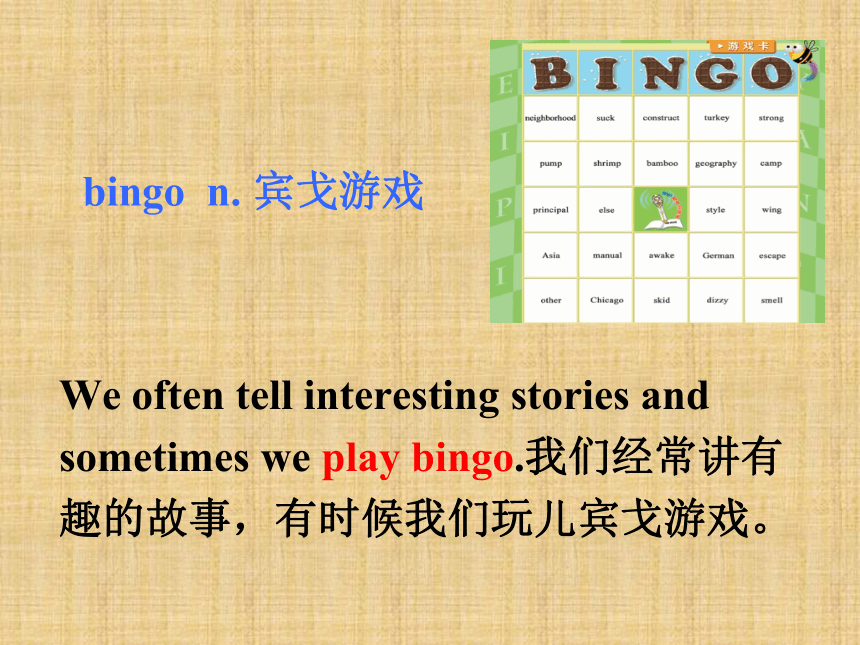

文档简介
课件23张PPT。Unit 4 After-School Activities Lesson 19 A Dinner Date Our school has a lot of after-school activities. 我们学校有许多课外活动。activity n. 活动New wordsvolleyball n. 排球-How about playing volleyball after school?
放学后去打排球怎么样?
-Sorry, I can't. I'm going to the park to plant trees with my father.对不起,我去不了。我要和爸爸去公园里种树。I have volleyball practice every Wednesday.我每周三练习打排球。practice n. /v. 练习I practice playing volleyball every Wednesday.我每周三练习打排球。chess n. 国际象棋-Would you like to play chess with me?你愿意和我一起玩国际象棋吗?
-Good idea. 好主意。club n. 俱乐部I'm going to the chess club after school.放学后我要去国际象棋俱乐部。volunteer v. 自愿帮助
n.志愿者I usually volunteer at the Old Age Home.
我周四通常在敬老院当志愿者帮忙。
Sometimes very old people can't take care of
themselves. So, they go to an Old Age Home.
They can get help there and meet new friends.
Many volunteers help there on weekends.
许多志愿者周末在那儿帮忙。bingo n. 宾戈游戏We often tell interesting stories and
sometimes we play bingo.我们经常讲有趣的故事,有时候我们玩儿宾戈游戏。both adj. /pron. 两者的,两者My friend and I are both busy every day.我朋友和我每天都很忙。nothing n./ pron. 无事 无物-What are you going to do this evening?
你今天晚上要做什么?
-I have nothing to do this evening.
我今天晚上无事可做。come over 过来,顺便来访-Would you like to come over for dinner
tonight ? 你愿意今晚过来吃饭吗?
-Yes, I'd love to.是的,我愿意去。do well in 在...方面做得好I have math classes on Fridays.
我周五有数学课。
I'm not doing well in math this term.
这个学期我的数学学得不太好。I am not good at math.
我数学学得不太好。activity
volleyball
practice
chess
club
volunteer
bingo
both
nothing
come over
do well in n. 活动
n. 排球;排球运动
n.&v. 练习
n. 国际象棋
n. 俱乐部;社团
v. 自愿帮助;n. 志愿者
n. 宾戈游戏
adj.&pron. 二者(的)
n.&pron. 无事;无物
过来,顺便来访
在...方面做得好=be good at New words and phrasesListening√√Reading2. What is Steven going to do? Read the lesson and write down his schedule for the week.Have dinner with JimHave volleyball practiceVolunteer at the Old Age HomeHave math classesMondayTuesdayWednesdayThursdayFridaySaturdaySunday1. Would you like to come over for dinner tomorrow? Would you like to…? 你愿意……吗?用于委婉地提出建议。肯定回答:Yes, I’d like/love to.
否定回答: I’d like/love to, but …——Would you like to go for a walk with me?
——________. But I have to clean the living room first.Yes. I would B. No, I wouldn’t
C. Sorry D. Yes, I’d love to.DLanguage pointsboth 指两者, all 都,全部(三者以上)
我的父母都是老师。
My parents are both teachers.
我们班的学生都喜欢音乐。
The students in our class all like music.2. We’re both busy all week.She is going to study in Canada next year.
She will study in Canada next year.We are going to swim this weekend.
We will swim this weekend.他明年要去加拿大学习。 这个周末我们将去游泳。 3.I’m going to the chess club after school.be going to 表示(有计划,有目的)打算做某事,和表示将来的短语连用。和我们学过的will的用法相近。“be going to +动词原形” 结构 表示将来的动作或状态
基本句式陈述句
(否定句)一般疑问句特殊疑问句主语+be(not) going to +动词原形 + 其它.I am(not) going to watch a movie this weekend. 这周末我打算去看电影。Be + 主语 + going to + 动词原 形 + 其它?Is Eric going to visit his grandparents next month?下个月艾瑞克会去看望他的祖父母吗?—Yes, he is.是的,他会去。特殊疑问词 + be + 主语 + going to + 动词原形 + 其它?What are you going to do this Sunday?这个周日你打算做什么?3.Fill in the blanks with the correct form of “be going to”.1. We _________________ (have) a party for Mum’s birthday tomorrow.
2. Alice ___________________ (borrow) some books from the library after school.
3. My family ___________ (go) on a trip to Beijing next week.
4. Tom and Jim _________________ (make) a model plane together this weekend.
5. I ________________ (be) a volleyball player in the future. I enjoy volleyball so much!are going to haveis going to borrowis goingare going to makeam going to beHomeworkWork in pairs. What are you going to do after
school this week? Make up a dialogue.Example:
A: What are you going to do after school on Wednesday?
B: I’m going to see a movie with my friends. What are you going to do on…?
A: I’m going to …
放学后去打排球怎么样?
-Sorry, I can't. I'm going to the park to plant trees with my father.对不起,我去不了。我要和爸爸去公园里种树。I have volleyball practice every Wednesday.我每周三练习打排球。practice n. /v. 练习I practice playing volleyball every Wednesday.我每周三练习打排球。chess n. 国际象棋-Would you like to play chess with me?你愿意和我一起玩国际象棋吗?
-Good idea. 好主意。club n. 俱乐部I'm going to the chess club after school.放学后我要去国际象棋俱乐部。volunteer v. 自愿帮助
n.志愿者I usually volunteer at the Old Age Home.
我周四通常在敬老院当志愿者帮忙。
Sometimes very old people can't take care of
themselves. So, they go to an Old Age Home.
They can get help there and meet new friends.
Many volunteers help there on weekends.
许多志愿者周末在那儿帮忙。bingo n. 宾戈游戏We often tell interesting stories and
sometimes we play bingo.我们经常讲有趣的故事,有时候我们玩儿宾戈游戏。both adj. /pron. 两者的,两者My friend and I are both busy every day.我朋友和我每天都很忙。nothing n./ pron. 无事 无物-What are you going to do this evening?
你今天晚上要做什么?
-I have nothing to do this evening.
我今天晚上无事可做。come over 过来,顺便来访-Would you like to come over for dinner
tonight ? 你愿意今晚过来吃饭吗?
-Yes, I'd love to.是的,我愿意去。do well in 在...方面做得好I have math classes on Fridays.
我周五有数学课。
I'm not doing well in math this term.
这个学期我的数学学得不太好。I am not good at math.
我数学学得不太好。activity
volleyball
practice
chess
club
volunteer
bingo
both
nothing
come over
do well in n. 活动
n. 排球;排球运动
n.&v. 练习
n. 国际象棋
n. 俱乐部;社团
v. 自愿帮助;n. 志愿者
n. 宾戈游戏
adj.&pron. 二者(的)
n.&pron. 无事;无物
过来,顺便来访
在...方面做得好=be good at New words and phrasesListening√√Reading2. What is Steven going to do? Read the lesson and write down his schedule for the week.Have dinner with JimHave volleyball practiceVolunteer at the Old Age HomeHave math classesMondayTuesdayWednesdayThursdayFridaySaturdaySunday1. Would you like to come over for dinner tomorrow? Would you like to…? 你愿意……吗?用于委婉地提出建议。肯定回答:Yes, I’d like/love to.
否定回答: I’d like/love to, but …——Would you like to go for a walk with me?
——________. But I have to clean the living room first.Yes. I would B. No, I wouldn’t
C. Sorry D. Yes, I’d love to.DLanguage pointsboth 指两者, all 都,全部(三者以上)
我的父母都是老师。
My parents are both teachers.
我们班的学生都喜欢音乐。
The students in our class all like music.2. We’re both busy all week.She is going to study in Canada next year.
She will study in Canada next year.We are going to swim this weekend.
We will swim this weekend.他明年要去加拿大学习。 这个周末我们将去游泳。 3.I’m going to the chess club after school.be going to 表示(有计划,有目的)打算做某事,和表示将来的短语连用。和我们学过的will的用法相近。“be going to +动词原形” 结构 表示将来的动作或状态
基本句式陈述句
(否定句)一般疑问句特殊疑问句主语+be(not) going to +动词原形 + 其它.I am(not) going to watch a movie this weekend. 这周末我打算去看电影。Be + 主语 + going to + 动词原 形 + 其它?Is Eric going to visit his grandparents next month?下个月艾瑞克会去看望他的祖父母吗?—Yes, he is.是的,他会去。特殊疑问词 + be + 主语 + going to + 动词原形 + 其它?What are you going to do this Sunday?这个周日你打算做什么?3.Fill in the blanks with the correct form of “be going to”.1. We _________________ (have) a party for Mum’s birthday tomorrow.
2. Alice ___________________ (borrow) some books from the library after school.
3. My family ___________ (go) on a trip to Beijing next week.
4. Tom and Jim _________________ (make) a model plane together this weekend.
5. I ________________ (be) a volleyball player in the future. I enjoy volleyball so much!are going to haveis going to borrowis goingare going to makeam going to beHomeworkWork in pairs. What are you going to do after
school this week? Make up a dialogue.Example:
A: What are you going to do after school on Wednesday?
B: I’m going to see a movie with my friends. What are you going to do on…?
A: I’m going to …
同课章节目录
- Unit 1 A Trip to the Silk Road
- Lesson 1 A Trip to China
- Lesson 2 Meet You in Beijing
- Lesson 3 A Visit to Xi'an
- Lesson 4 A Visit to Lanzhou
- Lesson 5 Another Stop along the Silk Road
- Lesson 6 Jenny's Diary
- Unit 2 It's Show Time!
- Lesson 7 What's Your Project about?
- Lesson 8 Marco Polo and the Silk Road
- Lesson 9 Danny's School Project
- Lesson 10 Music and Dance
- Lesson 11 Food in China
- Lesson 12 A Blog about the Silk Road
- Unit 3 School Life
- Lesson 13 How Is School Going?
- Lesson 14 Jenny's School Life
- Lesson 15 Making a Difference
- Lesson 16 We Are with You!
- Lesson 17 School Science Fai
- Lesson 18 Teaching in China
- Unit 4 After-School Activities
- Lesson 19 A Dinner Date
- Lesson 20 Join Our Club!
- Lesson 21 What Is Your Club Type?
- Lesson 22 Big Plans for the Weekend
- Lesson 23 A Weekend with Grandma
- Lesson 24 How was Your Weekend?
- Unit 5 I Love Learning English!
- Lesson 25 A Phone Friend
- Lesson 26 Online Phone Calls
- Lesson 27 Amazing English
- Lesson 28 How Do I Learn English?
- Lesson 29 A Door to the World
- Lesson 30 Writing an E-mail in English
- Unit 6 Seasons
- Lesson 31 What Strange Weather!
- Lesson 32 I Can't Wait for Winter!
- Lesson 33 Kim's Favourite Season
- Lesson 34 Steven's Report
- Lesson 35 Surfing in Sydney
- Lesson 36 Spring in China
- Unit 7 Sports and Good Health
- Lesson 37 You Are What You Eat!
- Lesson 38 Stay Healthy!
- Lesson 39 Danny's Report
- Lesson 40 Move Your Body
- Lesson 41 Were People Healthy Then?
- Lesson 42 Know Yourself
- Unit 8 Summer Holiday Is Coming!
- Lesson 43 Have a Good Summer!
- Lesson 44 Volunteering in Summe
- Lesson 45 Baseball Season
- Lesson 46 Get Ready for Summer Holiday!
- Lesson 47 Summer Plans
- Lesson 48 Li Ming's Summer Holiday
